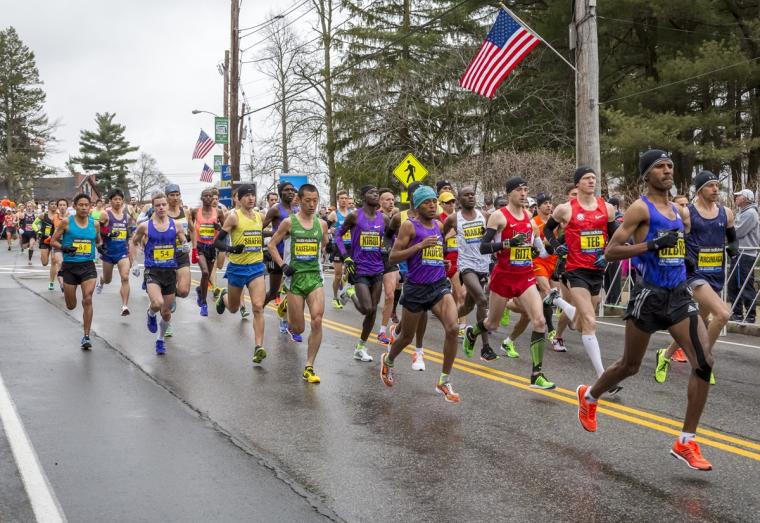
The Boston Marathon, considered the Holy Grail of endurance runners, has stringent entrance requirements, leading more than a few people to cut the course of qualifying races in order to falsify their finish times.
No matter what the competition is, people want to win. And unfortunately, they’ll sometimes take almost any route to ensure they do – even if it’s illegal. remember the guys who cheated by sticking weights in their fish in a walleye tournament a while back? One was also a deer poacher. Both served jail time, one lost his boat and both paid fines.
It’s actually not unusual; we’ve seen all kinds of cheating in fishing tournaments, as well as ways organizations are combatting it.
Most recently, though, headlines were made when a school principal (!) was found to have falsified her results at the Sarasota Marathon. Jennifer Bowmaster cut the course by about four miles. Her recorded finish time was 3:39:51(just under the Boston qualifying standard for her age group). However, it was noted, that finish time appeared to be two full hours faster than that of her 2021 Chicago Marathon finish – her last recorded effort.
And, notes Road Race Management, “There was another source of information: mile-by-mile splits in publicly posted Garmin data showing that her pace was never fast enough to come close to 3:39:41.”
The guy double-checking all these numbers is Derek Murphy. And suffice it to say that if Murphy is eyeing your finish time, you’re not having a very good day.
Murphy, who runs the website known as Marathon Investigation, is a numbers guy. Think Steve Kornacki, only without the white shirt and tie – and solely devoted to crunching marathon finish times.
His Twitter account (@MarathonInvestgr) explains everything he wants you to know: Numbers Geek. Using Analytics to Find Cheaters. Striving To Keep Cheaters out of The Boston Marathon and off The Podiums.
Murphy is a person whose time has come, skills-wise. Years ago, marathon cheating was likely easier to get away with. Lacking the electronic chips used today to record runners’ passage through a course, runners of yesteryear could create shortcuts with much more ease and use their finish time to garner fame – at least briefly. Wikipedia has some primo examples of this:
“In 1896, Spyridon Belokas rode in a carriage for part of the Olympic marathon in Athens after having supposedly dropping out of the race; he then appeared to have finished third to seemingly complete a Greek top-three sweep. After a protest by fourth-place finisher Gyula Kellner was upheld, Belokas was disqualified.
In 1904, Frederick Lorz dropped out of the Olympic marathon in St. Louis after nine miles, then hitched a ride in a car for the next 11 miles. After the car broke down, Lorz jumped back onto the course and jogged to the finish line, where he was greeted as the winner before his deception was uncovered.”
Yes, you read that right. They cheated while competing in the Olympics and were heralded as winners, at least for a time.
But wait! There’s more. In the fall of 1979, Rosie Ruiz rode the New York City Subway during the New York City Marathon, recording a good enough finish time to qualify for the following year’s Boston Marathon. Her time was, in fact, so good, that it was a course record for women. However, following the discovery that she had only run the last half-mile of the race, her medal was revoked and her result deleted from the records.
 Well, mostly deleted. To this day, runners jokingly refer to cutting courses as “pulling a Rosie.”
Well, mostly deleted. To this day, runners jokingly refer to cutting courses as “pulling a Rosie.”
Reporters at The Guardian, who studied the topic in detail, noted that in the modern age, “Setting aside doping, marathon cheats can be divided into two main categories. There are the bib mules: runners who compete under another competitor’s race number, typically in order to record a qualifying time for another prestigious race. (Bib bandits – runners who forge race numbers to secure entry to events – are a related but distinct category.) Then there are the course cutters, who engage in that most rudimentary cheating tactic: jumping a barrier or ducking under some tape to skip a section of the course.”
Setting up a challenge for would-be cheats is the fact that these days, marathon runners are tracked electronically. And, if it comes to that, they’re also tracked by Murphy.
Some stories are downright unbelievable; in one case, a woman who had picked up another person’s race bib was led off a Disney race course in handcuffs. But it seems she was already well known on the Disney circuit as a “serial bib thief,” stealing bib after bib in race after race.
The Chicago Marathon, another major, removed the results of more than 275 runners in 2023. It also noted individual cases, such as a woman who was paced in the race by her husband, who wore her bib from the previous year.
When called out for cheating, people get angry, threaten legal action – but sometimes they just confess. But in one case, a man committed suicide rather than face the shame of having years of race cheating exposed.
But as long as there are contests, there will be those who want to win, whatever the cost and whatever the risk. In fact, just last fall, in the Mexico City Marathon, one-third of all runners – a whopping 11,000 – had to be DQd when it was shown that they cut the course. (Apparently, this is nothing new; more than 6,000 runners were booted from the 2017 race and did not receive medals for finishing, and almost 3,100 racers were disqualified the following year.)

